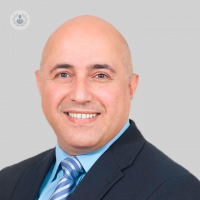What you should know about low testosterone levels
Escrito por:Low testosterone levels can cause a variety of symptoms which can impact significantly on quality of life. In this detailed guide, highly respected consultant urological surgeon Mr Aza Mohammed gives an expert guide to low testosterone levels, including how they occur, the symptoms patients often experience and the most common forms of treatment.

What is testosterone?
Testosterone is the main male hormone. It is produced by special cells in the testes (Leydig cells) and the production is under control of higher centres in the brain. Normal levels of testosterone are required to maintain the normal bodily functions in men such as the sexual and reproductive systems as well as other metabolic pathways.
What causes low testosterone levels?
Low testosterone levels, or hypogonadism as commonly known, can either be congenital due to testicular malfunction or acquired. The latter could be caused by a wide-range of conditions such as systemic diseases, certain medications or getting old.
What are the symptoms of low testosterone levels?
Men with low testosterone levels demonstrate sexual symptoms such as erectile dysfunction and loss of libido. In addition, there are general symptoms of lack of energy, low mood and sleep disturbances. Men can also exhibit hot flushes and breast enlargement in some extreme cases.
How are low testosterone levels usually detected?
Hypogonadism can be difficult to detect initially as the symptoms are usually vague and non-specific. The diagnosis is confirmed by a serum testosterone level of less than 12nmol/L. It is important that the test is done more than once and the blood is taken between 7-11 AM in the fasting state to ensure accurate results.
How are low testosterone levels corrected?
Once the diagnosis is confirmed, patients are usually prescribed testosterone replacement therapy (TRT). It is also important to identify any possible causes that can be reversed. Additionally, it’s vital to bear in mind that there are certain conditions that would make the patient unsuitable for TRT, such as a recent history of aggressive prostate cancer, male breast cancer and those with severe urinary symptoms, heart failure and sleep apnoea.
Your doctor would usually ask for a prostate exam and PSA blood test before initiating the TRT. Patients on TRT are warned that they might notice oily skin or acne and worsening of urinary symptoms.
TRT comes in different preparations such as oral, topical or by injection. Patients would usually notice an improvement in their symptoms soon after the initiation of therapy. The patients are invited for follow-up checks to assess symptomatic improvement and to ensure that the testosterone levels are back to normal.
Mr Mohammed is a highly revered consultant urological surgeon with over twenty years’ experience in men’s health and the field of urology. If you wish to schedule a consultation with Mr Mohammed, you can do so by visiting his Top Doctors profile.


